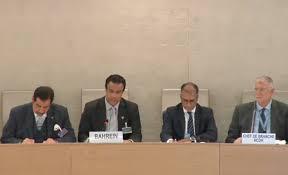
On September 21, 2017, the United Nations Human Rights Council (HRC) formally adopted its third round of recommendations to Bahrain in the framework of the Universal Periodic Review (UPR), a process aimed at assessing the human rights record of each UN Member State every four years.
Although several states made recommendations for Bahrain to, among other things, amend its criminal code and respect the right to freedom of expression in the country, the authorities denied the occurrence of any such violations, arguing that Bahrain’s domestic law was already in line with international standards.
Out of 175 recommendations made by the Council, Bahrain rejected 36, including those concerning the abolition of the death penalty and the ratification of core human rights instruments. In spite of the relatively high number of recommendations accepted (139), Bahrain did not vow to take any concrete measures to stop the ongoing repression of civil and political rights in the country.
Moreover, it is alarming that a very high percentage of recommendations made in this third round of the UPR repeat the calls for reform made during the previous UPR cycle, pointing to a lack of commitment from the Bahraini authorities to follow through on their pledges.
Criminalisation of freedom of expression and intimidation of human rights defenders
Despite calls from many states urging Bahraini authorities to refrain from committing acts of reprisals against political activists and human rights defenders, Bahrain bluntly denied such allegations and claimed that “there were no instances of arrest or detention of any journalist,” and that “criminal proceedings were never taken against legal persons or entities because of their exercise of political activities or for the protection of human rights,” unless such activities “clearly constituted a breach of the law.”
However, numerous human rights defenders are being arrested, prosecuted and frequently convicted after unfair trials, including under terrorism charges, for either criticising the government on social networks or for their cooperation with the United Nations mechanisms.
The arrest of Ebtesam Alsaegh is a case in point, as she has been held in detention without trial since July 2017, harassed, and prosecuted for terrorism-related charges, all as a result of her peaceful activism.
Bahrain also rejected recommendations to amend article 105b of the Constitution, under which civilians can be brought before special military courts, which often prosecute human rights defenders and peaceful activists for “illegal gathering,” “incitement to hatred,” “incitement to overthrow the regime,” or for “spreading false rumours.”
Alkarama encourages Bahrain to implement the recommendations made by several states to amend laws that criminalise criticism of the ruling elite or state authorities, and urges Bahrain to abstain from taking any restrictive measures or reprisals against human rights defenders, particularly those who cooperate with the United Nations bodies.
Torture: failing to ensure accountability
Although Bahrain pledged to investigate all allegations of torture and bring perpetrators to justice, the existing mechanisms for the prosecution of torture are ineffective and lack independence.
Bahrain established the Special Investigations Unit in 2012 and the Prisoners and Detainees Rights Commission in 2013 in order to ensure accountability for abuses perpetrated by members of the security forces. However, as several states emphasised in their recommendations, these mechanisms are unable to fulfil their mandate due to a lack of independence, impartiality and transparency.
Despite positive changes to legislation, the practice of torture has still not been eradicated. Numerous victims continue to raise allegations, while perpetrators are acting in a climate of impunity. Torture is mostly carried out in order to extract confessions, which are then used as the sole evidence in trials to convict the accused, as Alkarama documented in its shadow report to the Committee against Torture.
Revocation of nationality: a means of punishment and intimidation
Alkarama regrets that Bahrain rejected the majority of recommendations regarding the deprivation of nationality, a punishment systematically used as a tool of repression against political opponents and human rights activists, in violation of article 15 of the Universal Declaration of Human Rights.
In 2013, a decree amending the Anti-Terrorism Law introduced the revocation of nationality in addition to prison terms as a penalty for those found responsible for terrorism-related crimes. Similarly, the Bahraini Citizenship Law (1963), amended in July 2014, allows for the revocation of nationality, upon request of the Ministry of Interior, of any Bahraini citizen who “causes harm to the interests of the kingdom.” Such a vague provision, along with the broad definition of terrorism, allows for the revocation of citizenship to be used as a tool of repression and as a means of deterring peaceful activism.
For further information on the situation of civil and political rights in Bahrain, read Alkarama’s shadow report here.
For more information or an interview, please contact media@alkarama.org (Dir: +41 22 734 1008).
